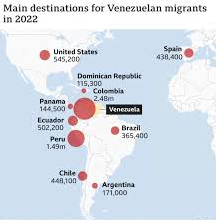The Humanitarian Crisis in Venezuela Continues as Millions Flee Amidst Political and Economic Collapse
The exodus of Venezuelans has reached unprecedented levels, with over 5.6 million people leaving the country since 2015. This mass migration, fueled by Venezuela’s ongoing political, economic, and social turmoil, has become the largest displacement crisis in Latin America’s history. The Venezuelan crisis, which has unfolded without the backdrop of war, is now impacting the region in profound and lasting ways.
Experts are warning that the effects of this crisis are likely to be felt far beyond Venezuela’s borders, as neighboring countries struggle to accommodate the influx of refugees and migrants. Eduardo Stein, the UNHCR special representative and joint IOM representative, emphasized that no country in Latin America has seen such a significant movement of people out of a once-wealthy nation, making it a landmark event for the region.
Stein also warned that “donor fatigue” is exacerbating the problem, as traditional donor countries have been hit hard by the COVID-19 pandemic, leading to a funding shortfall for humanitarian aid. The lack of adequate resources to support the displaced population threatens to worsen the crisis and undermine efforts to provide relief.
With millions fleeing Venezuela’s dire conditions, including food and medicine shortages, lack of basic services, and rampant violence, the entire Latin American region is now facing the long-term consequences of this exodus. Experts predict that the demographic and economic changes will have a lasting impact, fundamentally altering the landscape of Latin America for years to come.








